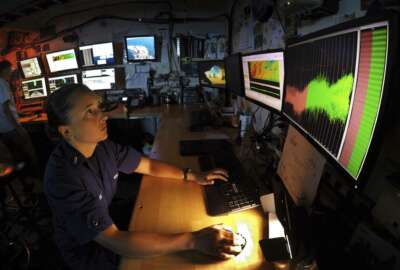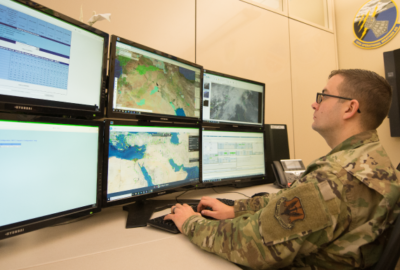Getting the findings from federal research out into the market
The Science and Technology Directorate has teamed up with GWU on moving federal research and development out into the market.
Best listening experience is on Chrome, Firefox or Safari. Subscribe to Federal Drive’s daily audio interviews on Apple Podcasts or PodcastOne.
Homeland Security’s Science and Technology Directorate has teamed up with George Washington University. The school is the site of a new center of excellence, in the highly specialized work of moving federal research and development out into the market. There’s a graduate degree for that. Joining Federal Drive with Tom Temin for more. the deputy director of the Office of Test and Evaluation Preparedness Programs.
Interview transcript:
Tom Temin: Mr. Simmons, good to have you on.
Greg Simmons: Good morning, Tom. Good to be here.
Tom Temin: Tell us about this program, it is a degree granting program through George Washington, tell us more.
Greg Simmons: Tom, it’s an exciting initiative that Science and Technology has been able to enter in with George Washington, traditional MBA, but with a focus on security technology transition. And I’m sure you and your listeners can appreciate that transitioning technology from the R&D environment into capabilities that can be used by the operator. It’s a challenge and that’s been documented across the federal government. So we feel like the MBA program will empower the workforce to be able to understand the nuances for markets and emerging technologies and intellectual properties so we can get beyond that valley of death or to those barriers to transition.
Tom Temin: Alright, let’s talk about first the source of the research and development that this program would seek to get out into the market. This is the type of work being done in federal laboratories, or in say academic laboratories under federal grant?
Greg Simmons: It runs the gamut of research in federal labs, private industry, so we want to be able to harness all of those good ideas, some of them are at the just the genesis, but they need to get into the hands of the operator and that’s been a point of a bearer that we have not been able to solve. So we think in addition to some of the things that Science and Technology is doing on the engineering side, there’s a business component that needs to be applied as well.
Tom Temin: And that business component then is the link between the research and the operator. Correct?
Greg Simmons: That’s correct. So understanding commercialization, so your traditional government program manager or finance, they may not be skilled in those type of skill sets that appreciate what the private sector needs to be aware of when you’re trying to scale up that capability to be used throughout the DHS environment.
Tom Temin: And I just want to define a couple of terms, when you say security technologies, that’s much more than cyber security, correct?
Greg Simmons: Yes. So when we’re talking about security technology, we’re thinking about all the technologies that would be applicable across the DHS enterprise. So it could be a knowledge product, it could be software, it could be a widget, as you’re aware of. But all of those things that are developed in the R&D environment, we need to eventually get it into the hands of the operators so they can accomplish the mission. What we’d like to say is a widget doesn’t accomplish any missions, but can the operator utilizing that widget, accomplish the needed mission? So that’s what we want to do and we hope the MBA will empower our workforce to better support the operator.
Tom Temin: And the operator, you mean law enforcement or TSA people? Those types of folks?
Greg Simmons: Yes. So that includes all of the frontline operators throughout DHS, of course, all of our operational and support components that are involved with research and development, procurement, acquisition. Those are the kind of the target audiences that we’re hoping the MBA would be able to assist.
Tom Temin: And those that would enroll in this program at George Washington, you envision those being federal employees also?
Greg Simmons: Yes. So that’s as part of the initiative, the initial outreaches to federal employees within Homeland Security, across all of the components or directorates as we might say. But the other component of that is to GW will be able to market this MBA to the public and we would hope that the cohorts would be integrated with students from private industry or students from academia, and so we get a nice mix and networking and cross pollenization. So all different populations would better understand the needs and requirements of each other, and those relationships that you forged in these classroom environment, hopefully they’ll take them out and it’ll be beneficial for years to come
Tom Temin: And give us some of the details. When does this get underway? Do you have the first cohort of students chosen and how do you choose them?
Greg Simmons: We’re in the initial stages working with George Washington. The award was announced just last week, we hope to have the first cohort in class by January of 2021. So that allows us time to recruit and select candidates that are working with George Washington. So we hope to have at least 25 students identified in the seats to begin by January of 2021.
Tom Temin: And for those coming in from the federal side, what are the requirements or the requisites or the background basics they have to have to be able to be eligible for the program?
Greg Simmons: We’re working closely with GW because we want to maintain their standards of folks go into the MBA program. But we typically understand that a successful candidate would have this background in finance, already working in the R&D fields or procurement, acquisition, or maybe in one of the acquisition program offices, obviously a bachelor’s degree and good recommendations from there, I don’t want to say chain of command that’s sort revealing my old DoD, but just from from their offices. So it’s a significant investment and we’re hoping that offices will be very careful and their selection process to make the impact for the workforce.
Tom Temin: And do you envision a typical scenario, say someone is now got an MBA, they work at Homeland Security in some capacity and suppose somewhere in a lab someone develops this tremendous widget that can both see coronavirus from 50 yards away and also tell if someone has a bomb in their underwear, and therefore it’s a great gadget for TSA — but it’s just a piece that was built in the lab. What do you envision someone with this degree doing such that this gadget gets into the operators hands?
Greg Simmons: GW already has a core curriculum that’s focused on the typical MBA coursework that you think — economics, finance, accounting — but what GW brings to bear is their technology centers, and they’re building a specific security technology transition that’s focused on new venture capital financing, technology, commercialization, and an entrepreneurship, and how to manage government intellectual property. So when you arm, the workforce with those types of skills, they’ll be placed back into the DHS environment and these program offices and will be able to advise senior leaders, advise program managers, advise their offices and shape the procurement packages and shape the developments so they can get past those, as you described Tom, that valley of death where it’s just a homework assignment or homework project and sits on a shelf and never gets used. And so we want to hopefully negate those things.
Tom Temin: I guess it’s a complicated process because you need to protect the taxpayer investment that created that intellectual property, yet you have to give industry enough incentive to be able to want to commercialize it.
Greg Simmons: Correct. You can appreciate this, maybe the government employee who’s had training in the typical acquisition or procurement environment, we understand the government regulations very well, but now we need that that understanding of the education of the private sectors perspective and what they’re up against in order to support the Homeland Security mission. Like I said before, we hope this curriculum that GW is putting together for us will will serve us in that way.
Tom Temin: Greg Simmons is program manager for Workforce Development and Minority Serving Institutions at the Homeland Security Department Science and Technology Directorate. Thanks so much for joining me.
Greg Simmons: Thanks Tom. Glad to be with you today.
Copyright © 2025 Federal News Network. All rights reserved. This website is not intended for users located within the European Economic Area.
Tom Temin is host of the Federal Drive and has been providing insight on federal technology and management issues for more than 30 years.
Follow @tteminWFED





